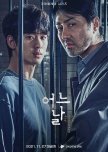
Kim Soo-Hyun’s Sublime Return To Thrillers…
Remake dramas can often go down two selective routes; diverging from the originality of its predecessor, or offering viewers a production en par with the original. Thankfully Coupang Play’s first series led by director
Lee Myung-woo, ‘ One Ordinary Day ‘ ( a remake of the original BBC series ‘ Criminal Justice’), offered viewers a fairly knockout adaptation with arguably darker explorations of the criminal judicial system, an intriguing setup as well as a brilliant cast lineup ( most notably A-list actor Kim Soo-Hyun as the main lead).
The series focuses upon seemingly “ model student” college-student Kim Hyeon-soo (Kim Soo-hyun). In an effort to apparently gain popularity Hyeon-Soo decided to hook up one night with Hong Kook-Hwa ( Hwang Se-on); a mysterious yet beguiling troublemaker. However Hyeon-Su’s fantastical night is cut short as he wakes up to a horrifying sight. Seemingly framed for a crime he didn’t commit, few seem to believe his plea for innocence- apart from gruff lawyer Shin Joon-Han ( Cha Seung-won). Alongside soft-spoken novice lawyer Seo Soo Jin ( Lee Seol), Joon-Han is determined to prove Hyeon-Su’s innocence yet as further problems arise in the case, the true question of justice begins to become more clouded along the way…
‘ One Ordinary Day’ delivers anything but mundanity for viewers - its heavy-going and macabre themes upon murder, crime, prison, corruption and injustice will likely not appeal to everyone. Whilst the first episode admittedly offers viewers a fast-paced and adrenal-infused episode, the latter episodes do hit a slight rut at times of struggling to maintain the same alacrity. ( Admittedly whilst some of these scenes were necessary for slowing down and building -up setups and characters, they’d sometimes disengage episodes from keeping viewers captivated by moving at a quicker pace.)
Casting top-actors in a lesser-known and more mature production can always be a gamble for both the actor as well as the company. However Kim Soo Hyun does not disappoint bringing forth a gut-wrenching performance as the main lead . Hyun-Soo is the ultimate enigma for viewers- a bright student and seemingly a kindhearted son, but his myriad of reckless decision-making causes him to start his hellish journey throughout the series. Naturally whilst the storyline never wanted to give too much away about Hyun-Soo’s ultimate final verdict , there were admittedly moments in the series surrounding Hyun-Soo which felt as though they could’ve been shown in more intrinsic depth. ( Including further insight into his relationship with his parents , his experiences with peers during his younger years ,Hyun-Soo’s college life as well as about his fight for survival in prison.)Even if the drama had offered these some of these moments as merely “Red Herrings” it could’ve allowed for more opportunities to have seen a multilayered onset for Hyun Soo as a character.
Alongside Kim Soo Hyun is costar Cha Seung Won who played the role of the unkempt lawyer with an air of rugged charm. Yet admittedly whilst there were intriguing elements to Seung Won as a written-character, the deuteragonist could often lack some greater and definitive focus on his backstory. Of course this isn’t to say that Shin Joong Han is a poorly-written character by any stretch of the imagination; the male lead is far from being a perceived as an impeccable guardian angel and instead nearly plays devil’s advocate in the courtroom - he has his own demons to deal with, personal motives for taking on his clientele for and is widely dismissed by the inner-circle of judges and prosecutor as being “ third-rate”. However the storyline could’ve admittedly been smoothed down more if the drama had given opportunities to understand more about his past.
Combined together with the vivid cinematographer of Lee Myung-Woo of vivid neon night shots against the mundanity of the court room , ‘ One Ordinary Day’ becomes a suspenseful reverse-psychology series where versatile themes surrounding corruption, drugs and abuse were played carefully with the murky lightning of flashbacks presented a moody and unsettling atmosphere against the lucid mundanity of tension. Inter played when necessary with the spine-tingling OST, ‘ One Ordinary Day’ was surprisingly masterful when it came to delivering some of its impactful scenes for viewers.
Naturally this brings us onto one of the greatest downfalls for ‘ One Ordinary Day’; the ending. Naturally the ending wasn’t inherently rushed with a notably slow-paced speed weighing down a major proportion of the final episodes in order to build-up towards the finale. On the other hand whilst the ending is certainly surprising for viewers and did seem to present a powerful statement message towards the unstable corruption of the judicial system in South-Korea, it did admittedly feel slightly anticlimactic for viewers with certain original links and questions remaining unanswered even by the final episode.
Nevertheless whilst the series could sometimes struggle with attaining constant and steady pacing as well as shaping out certain subplots, ‘ One Ordinary Day’ was a fairly thrilling and gripping series which offered brilliant performances by our cast and especially Kim Soo-Hyun as well as Cha Seung Won. The ending was admittedly slightly unexpected and failed to wrap up some more quintessential loose ends for viewers, but did undeniably deliver the reminder for audiences that ‘ One Ordinary Day’ was harrowing within its portrayal of the judicial system.
Was this review helpful to you?

Do Boys Like Their Girls, Do Girls Like Their Boys , Or Do Boys Like Their Boys?
Based upon the manga ‘My Love Mix-Up!’ (消えた初恋) and adapted onto the small screen by screenwriter Kuroiwa Tsutomu and directors Kusano Shogo and Horai Tadaaki, ‘ Kieta Hatsukoi’ will likely put off a lot of mainstream drama watchers by its bizarre setup and seeming cataclysmic conglomeration of outdated cliches and tropes.
The premise revolved around high schooler and main male lead Aoki Sota ( Michieda Shunsuke) ‘s initial crush on supporting character and female lead Hashimoto Mio ( Fukumoto Rio). Mio gives him her rubber during an exam and Aoki is left to believe that Hashimoto has a crush on popular classmate Ida Kousuke ( Meguro Ren). When Sota drops the rubber by accident Kousuke picks it up and misunderstands that Aoki has a crush on him instead . Aoki decides to protect Hashimoto’s feelings by pretending that the rubber was his, yet rather than Kousuke deriding Aoki after rejecting him ( as Aoki expected), he finds himself in a sticky situation when Kousuke wants to “ get to know” Aoki more personally. However Aoki soon finds himself developing real feelings for Kousuke as they begin to spend more together.
Against the fear of the drama being a parody of itself ‘ Kieta Hatsukoi’ surprisingly does not reimburse the typical tropes and writing cliches in predictable ways. Diverged screenwriting takes on classic tropes will likely surprise viewers by sudden “ predictable screenwriting decisions” being changed by the decisions of characters and the route towards the developed relationships onscreen.
From an acting perspective ‘ Kieta Hatsukoi’ is fairly solid. There are admittedly some line deliverances throughout the drama which felt a little enforced or poorly delivered, but overall our main cast did help to present a charisma for their onscreen personas.
Michieda Shunsuke helped to present a sense of awkward charm as his onscreen persona Aoki Sota; a laidback high schooler, who finds himself involved in an awkward position. As a main character Sota has his strengths and weaknesses; authentically he’s your typical “ awkward teen”- misunderstanding scenarios and hates getting into awkward social situations whilst having only one truly close friend through “ Akkun” ( Suzuki Jin). On the other hand one of the biggest problems at times with Sota’s character drive was that whilst we were supposed to understand his “ conflicting” feelings for Kousuke, there never really felt like they were moments where we were able to see thus transcend gradually onscreen.
To explain this further and without major spoilers one of the greatest character-drives for Aoki surrounds his initial feelings for Hashimoto before seemingly falling for Kousuke despite their “misunderstandings”. Whilst it isn’t out of the question for individuals to be ineffably attracted to someone, it seemed odd that as viewers, we never truly reached a more emotive epiphany in the series for Aoki’s feelings for Kousuke being explored in more depth. Additionally there’s the issue surrounding Aoki truly feeling like an actual “ teenager” in the series aside from sometimes being shoehorned into the cliche of the “ whiny teen”; we rarely get to understand more about Sota’s background and family and whilst we are presented with a little indication into his fairly casual-bickering relationship with his mother in episode 2 ( the voice belonging to actress Mitsuishi Kotono) , we didn’t have a lot of opportunities to explore or understand more about Sota’s family dynamic.
Of course this isn’t to critique Aoki’s character entirely. Whilst some of his flaws felt more enforced than others ( not least of all often being the root-cause of conflict between his potential chemistry with Kousuke), Aoki coming to terms with his feelings for his classmate was surprisingly sweet as well as his friendship with his former-crush Hashimoto. Upon the former character mentioned Hashimoto and Aoki’s friendship surprisingly did not play on overt stereotypes or cliches- Hashimoto did not hold “ contempt” for Aoki , just as the male lead did not hold a grudge against his former-crush either. Admittedly whilst it’s understandable that the series didn’t want to draw-out Aoki’s initial “ feelings” for Hashimoto, it often felt as though the topic was swept under the carpet for a major proportion of the seriesm rather than being used as a plot-drive to present a greater growth between the friendship of Aoki and Hashimoto.
This naturally brings us onto the main love interest of the series and main lead Ida Kousuke. Played with a stern yet laidback charm by Meguro Ren, Ida Kousuke is the archetypical “ all-round-ace ” student. He’s a popular classmate, academically smart and sporty. Initially this leads Aoki to believing that he is Hashimoto’s crush and seemingly his “rival in love”. Kousuke is admittedly shoehorned for a major proportion of the series as the “ polar opposite” of Aoki; rarely flustered, sociable and suave. Aside from Aoki’s seeming initial misconceptions of Kousuke being slightly aloof, Kousuke proves himself to be a genuinely good person both within his brief yet insightful relationship with his mother ( Matsushita Yuki) in episode 3, as well as his childhood friend Todoya Shun ( Mochizuki Ayumu).
However admittedly where Kousuke often felt as though he could’ve been explored in more depth revolved around his seeming “ hero’s complex”. It’s revealed that Kousuke’s initial inability to say “ no” to others made him struggle with turning down Aoki’s feelings. However consequently Kousuke often struggled with elements of understanding Aoki’s anxiety or stress in different scenarios which naturally could put a rut in their onscreen relationship. Whilst this personality trait was briefly explored near the ending of the series it felt as though it could’ve allowed more opportunities to see symbiotic and mutual growth for both main leads; Aoki struggling to grasp his feelings for Kousuke, and Kousuke finding himself attracted by Aoki’s kindhearted actions. The relationship between both characters admittedly is drawn upon “ misunderstandings” and “ plot tension”, but the ending helped to present a heartwarming outcome for both our main leads.
The main side characters of the series are Hashimoto and Akkun; both of whom provide themselves to be good friends in need to Aoki. Whilst no major spoilers will be given towards the direction taken with both characters their arcs and development time admittedly did give way to some underdevelopment by the ending of the series, whilst whilst sweet, lacked a satiable build.
As a consequence of the diverged attention between only two plot lines in particular ; our main characters and then the subplot, the series would often fall into a staid and cyclical pattern of rarely diverging in episode formula; a new “ obstacle / climactic conflict” to “ get in the way of the main leads”, and then suddenly a “ quickly thrown-in solution ” to “ resolve” matters. Admittedly it isn’t entirely uncommon for dramas to fall into a status quo episode structure the series rarely used opportunities to explore a more dynamic buildup. This led to some episodes’ pacing ( especially by the latter-half of the series) often feeling anticlimactic and lacking sound-resolve.
The cinematography of the series is admittedly basic at best- whilst minimalistic shots did arguably help to capture the simplicity of Aoki and Kousuke’s overt onscreen relationship against warmer palettes and shades adding a romantic tone, it felt as though the series could’ve facilitated camera angles more towards conveying the characters’ emotions openly or invoke pathos through the captured scenery of the series. Certain tracks of the OST were admittedly a little generic in between scenes but during more emotive scenes the lack of lyrics and emphasis on instruments, did help to convey the characters’ feelings during certain some of these moments onscreen.
Overall ‘ Kieta Hatsukoi’ was a heartwarming and sweet drama. The second-half up until the finale was admittedly on a slight downwards slope in comparison to the first-half with certain writing elements and characters failing to meet dynamic buildup. However it’s undeniable that decent acting by our main cast as well as an intriguing main couple helped to present a charismatic charm towards our main leads which for those looking for a fairly sweet and heartwarming romance storyline, then ‘ Kieta Hatsukoi’ is perfect for lighting up your mood.
Was this review helpful to you?
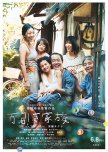
Will ‘ Shoplifters’ Steal Your Heart?
Hirokazu Kore-eda’s films have long been held as masterful arts of work in themselves; profound, complex and subtly crafted-something that ‘ Shoplifters’ presented beautifully throughout its storyline.
Lily Franky takes on the role of Osamu; the head of the band-wagon group of rouges seemingly appear as a middle-aged husband alongside his middle-aged wife Shibata Nobuyu ( Ando Sakura), their two children teenager Shibata Aki ( Matsuoka Mayu) and their young son Shibata Shiota ( Jyutu Kairi) and granny Shibata Hatsue ( Kiki Kirin). However the house is filled with untold truths and secrets; Osamu gaining most of his profit from shoplifting by enlisting the help of Shiota, Nobuyu stealing things from clothes’ pockets during her laundry job, Aki being part of a peep show in order to make ends meet and Hatsue’s seperate past life and gambling addiction at the local pachinko machines in secret. Yet the family find themselves ineffably stuck in a rut when they come across Juri ( Sasaki Miyu); an abandoned and abused little girl who is quick to warm their hearts but with undeniable consequences towards their future.
The casting choices of the move were undeniably brilliant with each actor feeling masterfully placed like pieces on a chessboard by Kore-eda. Yet admittedly one of the most dynamic of the movie came through Kiki Kirin’s role as Shibata Hatsue; sadly her last role before her passing shortly afterwards.
It should come as no surprise rust Kore-da’s unlikely Palmes D’Or winner offered viewers a sociopolitical depiction upon the deep-rooted trauma of a family united under one roof, alongside the fear of poverty. The narrative of the film took no wasted-time with subtly painting the dysfunctions of modern Japanese society and hypocrisies as well as the audacious details of characters and how they’d e linked together.
Yet against the beauty of the film’s narrative there was an admitted flaw with ‘ Shoplifters’ and that came through the initial problem of pacing. The film is admittedly slow-burn and whilst necessary for building up the storyline as well as delivering its twist-ending, lacked a greater sense of momentum towards the plot and attention of viewers.
Nevertheless Ryûto Kondô’s cinematography highlights a stark depiction of more grounded issues of the film such as child abduction, abuse and abandonment against the surrealist fantasy -world of Kore-eda’s microcosm of a seemingly mysterious family. The OST is admittedly less memorable than other parts of the film but Kore-eda’s placed emphasis on visual aesthetics other auditory became evident in the final act of the film beautifully encased in snow; a final flurried blur between the fairytale and childlike world of the family’s insular bubble and the cold and harsh reality of the events that are unfolding also.
Kore-eda’s ‘ Shoplifters’ is undeniably a heartwarming, bittersweet and audacious film about family. The subtle narrative and character-build was masterfully depicted alongside the strong performances by the cast. Admittedly whilst the film could sometimes hit a rut with pacing, the movie’s themes and finale offered viewers with a deeply thoughtful and contemplative film.
Was this review helpful to you?
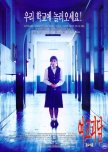
‘Whispering Corridors’? More Like Talking Corridors…
In retrospect ‘ Whispering Corridors’ is an oddly anomaly of a film. Released the same year as its more critically-successful and spine-tingling Japanese counterpart ‘Ringu’( 1998) , Screenwriter and director Park Ki-Hyung had been pushing the idea of the movie for numerous years beforehand in order to compete with the rising success of Japanese horror “Yurei “ ( ghost) movies in the Asian-film industry. However ironically whilst ‘ Whispering Corridors’ was a domestic box-office hit the film was neither truly a “terrifying” or well-executed due to a consequence of its patchwork and baffling narrative.
The premise of the film revolves around a teacher at an all-girls school who after stumbling upon the bizarre death of a pupil at the school several years ago is mysteriously found dead the next morning in a seeming act of suicide. Gossip soon begins to spread around the school towards the building being haunted by a vengeful spirit which new intern Eun-young (Lee Mi-yeon) who is, in fact, an ex-pupil and friend of Jin-ju, takes it upon herself to investigate, and comes up not only against a murderous spirit, but more importantly against the corrupt practices of the school authorities.
The acting front of the film is admittedly satisfactory to say the least- its not bad per say and certainly decent enough to watch through scenes, but poorly-paced dialogue deliverances and delayed expression reaction rarely added vivid realism to these moments either.
The horror elements of ‘ Whispering Corridors’ often felt as though there were reluctantly added by Park Ki-Hyung. Of course they exist in theory throughout the film from the presence of the ghost and the urban legends but rarely did they lack two quintessential elements for a horror film; fear and suspense due to lacking build-up or connected points in the storyline . Consequently the overture of ‘ Whispering Corridors’ felt as though it was a parody of the horror genre; over-the-top screams, dark camera angles and the classic “ blood on the wall” lacking anything but dread as further “horror” scenes also seemed to suffer from a farcical existence in the movie also.
Instead ‘ Whispering Corridors’ often felt as though it was supposed to be a social critique - a message which was surprisingly highlighted substantially in the movie. Park Ki-Hung seemed to provide an inherently strong anti-authoritarian streak; openly speaking out against corporal punishment, the impossible strive for perfection and exam results as well as notable taboos in South-Korean popular culture such as lesbianism, assault and corruption.
However sadly rather than these more profound themes helping to tie down the loose ends of ‘ Whispering Corridors’ this instead spiralled a patchwork narrative to take root frontal stage of the film with sporadic-jumps between subplots, heavy dialogues and poor-editing resulting in the film’s pacing feeling tedious. The ending did little to serve a sense of completion or spine-tingling chills for viewers with the outcome feeling more anti-climatic than satiable.
Ki-Hyung’s hand at cinematography was admittedly dated in places through low-budget camera shots and egregious editing at times, but it is praiseworthy to note that Hyung did experiment a lot with early day filming - techniques into Korean cinema such as long shots, pan shots as well as fade sequences throughout the duration of the film ( which are all still widely used today in the South-Korean film industry.)
Overall Park Ki Hyung’s ‘ Whispering Corridors’ is the movie which would’ve arguably done better as a standalone social-commentary movie, than a marketed “horror-flick”. Whilst the movie did admittedly inspire future filmmakers through its box-office success and experiment with the early days of Korean horror in the film industry, the evident comparison between the poorly-paced and mind-numbing narrative with an absent scare factor against its more spine-tingling and suspenseful Japanese counterpart cannot help but come into effect afterwards
Was this review helpful to you?

Will This Drama Win Your ‘ Affection’ ?
Screenwriter Han Hee Jung and director Song Hyun Wook’s ‘ The King’s Affection’ attempted to offer viewers the best of two worlds; a Sageuk ( historical drama) and an arguably more “ modern” love story. However against its more intriguing setup ‘ The King’s Affection’ found itself shoehorned into a slow-paced trope extravaganza by the second-half.Han Hee Jung’s facilitated writing techniques in the first-half of the series seemed to indicate towards foundational world-building and characters- rough around the edges with mystique driving forward many of the characters, but still establishing an intriguing storyline. However whilst Han Hee Jung’s first-part soared with potentiality the actuality of the latter-half gradually began to descend into a cataclysmic attempt to keep the plot interesting- uninspiring “ plot twists” led little time to truly develop more intriguing characters whilst seemingly paramount plot lineups were given an anticlimactic or loose-end outcome.
Of course a director or screenwriter choosing to convey modern twists or themes in a historical drama isn’t always necessarily a “ bad thing”. It can give opportunities to highlight or echo current issues, themes which are still present in today’s world and present different takes on the past through the director/ screenwriter’s objectives. However whilst it was easy to understand ‘ The King’s Affection’ desired depiction of different forms of love, it often felt as though the series would rarely touch upon more prominent issues of the time and today ( e.g. gender expectations, political division in society, social status and prejudice) in more depth. This often resulted in the second-half of the series feeling like a composed accumulation of romantic tropes and cliches against a gradually decadent plot-drive by the final episodes .
Main actress Park Eun Bin undeniably offered one of the strongest performances of the series; adding an air of charm to her onscreen counterpart. The female lead Dami was undeniably the epitome of the “ inserted” and frequently-used cross-dressing trope by having to play the role of her brother l the Crowned Prince Lee throughout most of the events of the series . Whilst with plot context it was necessary for driving the storyline, there were a lot of loose threads considering other story points including exactly why her grandfather ordered her to be killed ( aside from merely just being an “ unnecessary girl”), as well as one evident fact; the female lead’s feminine features and vocal intonations are evident even as her male counterpart . Admittedly whilst this may have just been passed off by members of the royal court it did hit a point blank in plot logic when many scenes and close-ups easily giving away Park Eun Bin’s softer features. Later episodes did little to truly allow Dami to come to terms with these cut-out subplots surrounding her storyline, ultimately reducing her seemingly intriguing character-drive to the equivalent of cannon fodder by the latter-half.
Costarring alongside Park Eun Bin is idol-actor Rowoon. Rowoon’s performance as main lead Jung Ji Woon did undeniably see some surprisingly bittersweet performance moments as his onscreen persona comes to terms with his sexuality and growing feelings for the Prince, as well as his initial motives for entering the palace. However Ji Woon’s initial establishment as the “ mysterious tutor” is subverted in later episodes to the “ lovelorn sweetheart”; pledging his own life to “ protecting” Hwi ( despite his initial reasons early on in the series) and benignly chasing after the female
lead’s affections in a dragged-out and anticlimactic love story. This often resulted in a test of patience for viewers as Ji Woon and Hwi’s sense of gradual chemistry and growth was shoehorned into a lacklustre onscreen relationship despite dominant screen time.
As a consequence of lacking development time potentially intriguing characters such as Lee Hyun-Hwi’s protective cousin ( Nam Yoon Su), the Prince’s mysterious bodyguard ( Choi Byung Chan), Shin So Eun - the daughter of the Minister of Interior ( Bae Yoon Kyung) and Noh Ha-Kyung; the youngest daughter of the Minister of War ( Jung Chae Yeon) were often enforced into staid plot setups and cliches with their character arcs and drives often being cut short.
The cinematography and OST of the series could admittedly vary from scene to scene. Whilst there were some admittedly beautiful shots and powerful soundtracks combined with scenes of the palace and period outfits presented by director Song Hyun Wook, more subtle emotions and scenes could often feel lacklustre from poorly-placed camera angles and song choices onscreen.
So what is left to say about ‘ The King’s Affection’? Is it worth watching or is it a waste of time? The ‘ King’s Affection’ is the epitome of a “ hot mess” series - stunning outfits, an intriguing premise, a fairly good cast lineup and an especially dynamic performance from main actress Park Eun Bin undeniably remained the drama’s greatest takeaways. However the twenty-episode formula applied to a storyline which was written better for no more than sixteen- episodes, created a slow-moving and disengaging second-half for viewers with intriguing subplots and characters left in the background in order to make way for a lacklustre romance which gradually dwindled to an unsurprisingly anticlimactic resolution. Overall whilst the 20-episode drama whilst not unwatchable and certainly decent enough if you are willing to watch out of sheer boredom, it does admittedly lack a more definitive spark of feeling well-rounded also.
Was this review helpful to you?

Controversial, Bloodthirsty Yet Classic…
Filmed by the late and venerable director Kinji Fukasaku ‘ Battle Royale’ sadly marked the director’s final film before his death but is unsurprisingly highly-regarded as Fukasaku’s magnum opus.
The “ fight-for-survival” genre in films and productions has long been held accountable through the success in Western literature and media. However ‘ Battle Royale’ has long been held accountable amongst Asian-movie enthusiasts as a classic modern game-changer to the genre and whilst often lesser-known against more recent productions, the drama’s legacy has notably lived on across popular culture as an ultra-violent social and sardonic satire upon teens, Japanese society and the widening romantic ideologies of violence in popular culture.
The movie imagines an alternate-future where Japan’s judicial system and government have broken down and delinquency amongst youths runs rampant. In an attempt to pass Draconian judgement upon the new generation the Japanese government puts into law the Battle Royale Act : a piece of legislation which means that a nominated group of young people are forcibly marooned together on an island, and forced to kill each other until one survivor is left.
In the current events of the movie reoccurring main lead bitter and spiteful teacher Kitano ( Beat Takeshi) nominates his class for their acts of disobedience by skipping lessons- explaining the rules and sending the bewildered teens out into the wild of the island as he watches gleefully from afar as the teens begin to grow nastily animalistic as cliches fall apart and distrust runs rife.
The bloodthirsty violence of the movie had admittedly remained a great divide for viewers with some perturbed by the explicit scenes of massacres and blood amongst a main cast of predominantly teenagers ( sans Takeshi and
Ando Masanobu) whilst others may note a form of wry satire by the director against his own personal experiences during childhood as well as intertwined with masterfully-stunning scenes and shots.
There’s a wide range of different characters in addition to Kitano throughout the film; our reoccurring main lead
Shuya Nanahara ( Tatsuya Fujiwara) who remains strongly morally-guided throughout the movie by promising to protect his deceased friend Yoshitoki crush and his classmate Noriko Nakagawa ( Aki Maeda) ; a reserved and good student who was often a prime victim of bullying in her class, Shogo Kawada ( Taro Yamamoto) - the ragtag and gruff transfer student alongside the antagonistic drive of sociopath Kazuo Kiriyama ( Masanobu Ando) and dysfunctional classmate Mitsuko Souma( Ko Shibasaki) play pivotal roles throughout the storyline.
Admittedly whilst the opening brought a proficient introduction to our main players and the world-building of the series where delirium and fear plague the teens during their descent into moral decadence, the main- climax of the movie could often lack proficiency. Whilst the duration length and pacy storyline had to maintain more subtle backstories and revelations the movie could often lead some key characters towards feeling less-developed than others and sometimes less engaged at times in the tales of friendships, betrayals, attractions, crushes and unrequited loved which emerge in the blood battle.
However the entirety of the movie can be often to be cited as not merely just a satire but a metaphor toward the painful and anguished experiences of youth which is brilliantly brought to life by the spine-tingling soundtrack of the series ( which is most notably reciprocated in recent films and productions as a homage to the film.) The ending of the movie is initially divisive but does offer contemplation for viewers. Overall a classic movie which whilst not for the faint hearted is powerful.
Was this review helpful to you?
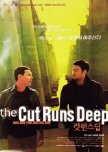
An Unimaginative Gangster Movie…
South-Korean director and screenwriter John H. Lee’s ‘ A Cut Runs Deep’ (1999) is a movie which is often unspoken about and hidden under the radar amongst South-Korean movie enthusiasts. Yet whilst Lee’s visually streamlined movie presented some intriguing themes within its notable Asian-American cast and certain ultra-violent scenes, ‘ A Cut Runs Deep’ could often fall victim to its cliche-ridden script.
The storyline is set in New York and focuses on half-Korean Ben (Alex Manning); the main character and narrator of the film. Ben works as a delivery boy at a dingy Chinese restaurant which he also resides in and during a particular delivery he ends up encountering a suave and introverted young man called JD (David Lee McInnis). There’s an oddly dangerous air surrounding JD which Ben can’t quite put his finger on but after taking a shining to the young male lead, JD ends up imitating Ben into his gang and leads his down a violent and destructive path.
Admittedly whilst the dialogue could sometimes feel slightly lacking during quintessential moments arguably one of the greatest standouts of the film came through main leads’ Alex Manning and David Lee McInnis’ onscreen performances- adding a touch of brutal humanity even during more generic moments of the series.
However where an ultimate downfall lay with ‘ A Cut Runs Deep’ was that Lee didn’t seem to be trying to add his own personal touch to otherwise overused genre of film . Naturally its evident that there were socio-commentaries in the storyline which were brushed over from economic and social injustice in Asian communities, prejudice and racism which can occur also for biracial individuals. However in a film where our main lead is stuck on the edge between his biracial identity and a seeming ticket of freedom out of his deadbeat job, Ben’s own opinions and character drive rarely seemed to reflect more profound reasoning for the existence of these themes in the movie with Lee executing these commentaries into more effect .
Naturally this resulted in the seeming chronicle transition between Ben being an “ innocent child” and a “ gangster” rarely feeling more impactful for viewers due to lacking scenes of being able to see the main leads’ development in more depth. Consequently Lee’s heavy reliance upon an an abundance of snipped and inauthentic “ gangsta”-style dialogue and poorly-developed stock characters ( “ the prostitute girlfriend” and the “ intimidating loose-cannon boss”) often create awkward and forgettable scenes for viewers. A low-budget admittedly did not necessarily give the drama a great start with filming advancement, but the dichotomy between imaginative and generic filming techniques by Lee became evident throughout the film, with an ending which didn’t seem to truly deliver its intended greater impact also.
Overall whilst not an unwatchable film with decent performances by our main leads, social commentaries towards issues which are still prevalent today and certainly should be given some praise amongst attempting to subvert certain generic stereotypes and cliches of Asian-gangster flicks of its time, Lee’s ‘ A Cut Runs Deep’ is a fairly generic gangster flick which lacks elements of ingenuity and memorability also.
Was this review helpful to you?
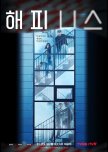
The Eternal Search for ‘ Happiness’…
Against its seemingly antithetical title screenwriter Hang Sang Woon and director Ahn Gil Ho’s‘ Happiness’ attempted to mirror similar issues from prejudice, isolation and loneliness which occurred particularly during the COVID-19 pandemic period. The unusual combination of genres highlighted a hellish fight to not only escape from the “infected “( the mysterious disease ravaging the population and leaving the infected in a zombie-like and feral state with few lucid moments ), but surprisingly a bittersweet love story between its main leads also .
The TVN drama presented an odd accumulation of fast-paced thrill and tension through its plot twists as well as tender and bittersweet scenes by taking a moment to slow-down the storyline and allow viewers’ to contemplate and soak in events. Yet like most intriguing fusion-genres in execution ‘ Happiness’ could sometimes not escape certain pitfalls of writing errors and character-drive along the way.
Of course ‘ Happiness’ offered viewers a fairly impressive lineup of acting abilities and most notably our main cast. Actress Han Hyo Joo brought forward Yoon Sae-Bom to life through adding an unlikely sweet charm to her onscreen persona ; a professional counter-terrorist operative whose pursuit of happiness by moving into a new apartment proves only to be a blunder during the events of the series. Sae-Bom’s reactions and interactions with others throughout the series could often feel prosaic during early episodes; initially driven for the “sake of plot “ rather than upon reflection of viewers getting to understand more about the female lead through subtle character growth . Nevertheless as the series progresses Sae-Bom provided to be a major asset to the plot and allowed some time to focus on developed sides of Sae-Bom’s personality from altruism to stubbornness in order to present some focus on the importance of humanity and depth within the female lead.
Costar Park Hyung Sik’s reprisal of an intriguing role was highlighted through his onscreen persona Jung Yi-hyun ; a suave and observant detective investigator who had shared-history with female lead Sae-Bom from their school days and provided to be one of the first key characters to come across findings of the mysterious disease during a case. Yet whilst Yi-Hyun was undeniably an intriguing character he could often suffer from the fate of many main characters through becoming an inherent “ plot device”; necessary to keep the storyline moving, but sometimes lacking in more subtle character development. Naturally Yi-Hyun did have golden opportunities to be explored in more depth during some key moments in the series but this could sometimes lack greater exploration.
As far as the chemistry between our main leads is concerned ‘ Happiness’ admittedly was a bumpy road- good onscreen chemistry between Hyung Sik and Hyo Joo could often fall victim to more staid cliches and setups which did not always weigh up against the more heavy-hitting moments of the series. Naturally later episodes took a little more time out to focus on some subtle relationship development between the main leads but often this was interwoven with more serious scenes and storyline moments also.
the supporting characters of the drama also have an intriguing part in events of the drama from Han Tae Seok ( Jo Woo Jin); a discharged military informant agent to the residents of the apartment ( some of which are admittedly less well-defined than others.)
Ahn Gil Ho plays upon subtle palette changes and lighting tones throughout the mis-en-scénes of the drama - key scenes crafting an important ambience throughout the series through this setup and pragmatic choice of OST, whilst some quintessential moments admittedly lacked the same ingenuity when required.
‘ Happiness’ offered viewers an intriguing concept with a dash of profundity and romance in between its zombie-style thriller setup- it isn’t inherently terrifying , but director Ahn Gil Ho and writer Hang Sang Woon are able to add a touch of suspense and sweetness in an intriguing and pacy storyline. The writing could sometimes wane through the pressure placed initially upon odd tropes, cliches and setups( especially for our main leads) during early episodes.( Alongside the heavily dominant setting of the apartment growing slightly bland.)However later scenes spent time focusing upon the storyline in more depth; brilliantly brought to life by our main cast’s dynamic performances by our main leads and the interwoven cinematography of the director. The ending was admittedly filled with a few loose ends but did deliver a sense of completion for the series. Overall whilst ‘ Happiness’ wasn’t without its more evident writing faults the drama offered an intriguing storyline with contemplation with a good cast and intrigue for viewers, as well as allowing room for philosophical thought towards the true definition of happiness in life.
Was this review helpful to you?
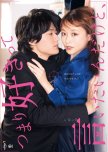
A Decadent Rom-Com…
Reminiscent of the bygone era of early 2000s Shoujo ( aimed traditionally at young girls) and Josei ( typically targeted at an audience demographic of older teens and young women) manga setups as well as being based upon the eponymous manga , ‘Tsumari Suki tte iitai n Dakedo’ ( alternatively known as ‘ つまり好きって言いたいんだけど’, or ‘ I Mean, I Want To Say I Like It’ ) tells the seemingly “ unusual” love story between Saejima Chitose ( Ohara Sakurako) and Fujishiro Sena ( Sakurai Kaito). A former teacher-turned manager at a small entertainment company, Chitose’s new position turns into a hellish experience when she’s assigned to be manager to Fujishiro Sena; a haughty playboy actor who also happens to be her childhood bully.However with a streak of reimbursed and outdated cliches and tropes being inserted into a seemingly decent love story, this does leave Japanese-drama enthusiasts with one burning question ; “ Is ‘Tsumari Suki tte iitai n Dakedo’ ‘s drama-adaptation poorly executed for a modern audience or is it actually worth watching?”
Perhaps one of the greatest things to clear up about ‘ Tsumari Suki tte iitai n Dakedo’ is that it isn’t an inherently over-stimulating drama for your brain . Of course this isn’t to drag down the series entirely based upon this setup alone. “ Fluff” dramas can act as an ideal form of escapism for viewers always from the bogged-down details of reality and fill viewers’ with an uplifting aftertaste. However it should be noted that whilst ‘ Tsumari Suki tte iitai n Dakedo’ often crossed over into more melodramatic plot moments, the drama often reached a cataclysmic standstill upon actually trying to execute these storyline scenes onscreen- generic cliches and setups propping up plot where character-driven moments should’ve been became more prominent even after the first episode , and characters who were initially introduced with strong plot motivation and drive soon felt shoehorned into scenarios which made little coherent sense in regards to their character archetypes overall.
The epitome of this poorly-executed screenwriting was particularly present within main female lead Saejima Chitose. By default Chitose had arguably all the potentially good traits of a well-written character; headstrong with her values (due to the incident in her past with the main lead ), possessing a heart of gold and presenting idiosyncratic mannerisms and qualities which immediately attract people towards her. Yet rather than seeing opportunities for Chitose to become a definitive presence in the series and power through her own personal struggles , the female lead’s greatest downfall was that she rarely had definitive character drive.( Not least of all her initial causes for her jobs, her experiences in relationships- romantic and platonic- in later life and whether her experiences from her early childhood had a traumatic or knock-on effect with these relationships were never explored.) ‘ Tsumari Suki tte iitai n Dakedo’ often seemed to portray Chitose somewhere between the scapegoat for getting into misunderstandings upon “ her behalf” as well as a carte blanche female lead; happily “ forgiving ” her childhood tormentor Fujishiro Sena ( without a coherent reason aside from enforcing their questionable romantic relationship ). However in between staidly keeping her mouth shut or blowing up in order to keep the plot “ tense”, Chitose’s experiences were often downgraded towards merely being a “ Mc Guffin”; a wasted opportunity to explore her ambivalent feelings and sentience in-depth as her character’s persona was reduced to the equivalent of a doormat for other characters to walk upon and maltreat.
Many overt golden opportunities for character growth and relationships were often tossed aside in ‘ Tsumari Suki tte iitai n Dakedo’ and none so was this more for the onscreen role and presence of main male lead Fujishiro Sena.
As the childhood “tormentor” of Chitose and now an aspiring actor with an aloof and haughty attitude, Sena was evidently never supposed to be viewed by audiences initially as a “ likeable” main lead. Yet where dramatic irony became prominent was that when it attempted to “ redeem” its “ unlikeable” characters for viewers, ‘ Tsumari Suki tte iitai n Dakedo’ generated more indecisive feelings amongst its audience demographic. Fujishiro Sena was always supposed to play the role of Chitose’s foil throughout the series; whilst Chitose is sweet and slightly naive , Fujishiro is slightly jaded and arrogant. Yet when the open opportunity arose to present Fujishiro in more “ heroic” light the series attempted to go down the route of Fujishiro Sena seemingly been “ pitied” and “misunderstood” by others. ( Without truly delving into any true raison d’êtres for Fujishiro wanting to become an actor or hints into how others perceived him through his past relationships - aside from some of his lovers.) Naturally whilst this did present some differing ideologies between our main characters ( which were never explored also), the drama seemed unaware of its initial presentation of Fujishiro Sena often as a manipulative and downgrading bully even in Chitose’s adult-life - instead attempting to write off these moments as merely “ comical” rather than allowing these to remain an open topic of discussion and truly allow Fujishiro Sena to redeem himself not through the lens of ineffective “ pity”, but maturity and reconciliation .
Consequently the onscreen “ romantic” relationship between Chitose and Fujishiro Sena remained openly crushed under the weight of shoehorning both main leads into an enforced setup where neither lead could truly free themselves from the heavy burden of their shared past, as well as maturely and openly talk about their problems. ( Aside from then permitting an ensue of “ romantic cliches”, misunderstandings and “ plot tension” through heated arguments- leading to an leading to an awkwardly uncomfortable romantic onscreen relationship which presented neither comfort and joy for viewers, or well-written chemistry between our leads.
)Additionally there’s also the side characters of the series; generically fading into the background after their initial introduction in most episodes, and only truly remaining present during a moment of “ tension” or “ plot drive” in order to attempt to keep the plot engaging with audiences.
Another issue which had admittedly divided audiences surrounds the chosen-cast; some may love main leads
Sakurako and Sakurai Koto‘s nearly-farcical onscreen roles and perceive this as irony , whilst some may be turned-off by poor dialogue exchanges and over-the-top acting leading to some choppy scenes for viewers to attempt to get through. Then there’s the cinematography and chosen OST of the series . Rather than using interwoven mise en-scènes in order to explore the emotions and world-building of ‘ Tsumari Suki tte iitai n Dakedo’, the drama was staidly placed on a pedal stool of insipid and forgettable songs alongside long-shot and singular camera shots which did little to truly promote viewers’ intrigue.
So what’s left to say about ‘ Tsumari Suki tte iitai n Dakedo’ and is it actually worth watching ? ‘ Tsumari Suki tte iitai n Dakedo’ was undeniably lighthearted. Whilst it attempted to offer an ultimatum of “ fluff” and melodrama throughout the story, it often found itself struggle to to subvert itself from unoriginal writing tropes and pitfalls and consequently characters often felt misplaced against scenarios and scenes . The ending was enough to bring events to a close but lacking in surprise by the delivered result.Overall ‘ Tsumari Suki tte iitai n Dakedo’ was not an inherently terrible with a sweet premise and concept which is easy enough to binge-watch . However the drama rarely facilitated golden opportunities to escaping its initial status quo reputation by lacklustre writing decisions and directing techniques leaving the drama with forgettable moments and many loose ends.
Was this review helpful to you?
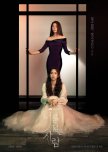
This review may contain spoilers
A Slow Descent Into Hell…
Life is rarely a straightforward and narrow road and for artist Hee Joo (Hyun-Jung Go), her road seems to be an incessant path of bumps, twists and turns as she gradually begins her descent into “ Hell”.
The storyline places emphasis upon unravelling questions towards Hee Joo’s fall from grace.The female lead seems to have all ; she had a rough start but now has two beautiful children, a doting husband, a lovely home, and a successful art career, yet something still seems to haunt the female lead . Yet when a terrible incident happens to her daughter Ri-Sa (Su-an Kim), Hee-Joo is shocked to end up meeting someone she used to know in her past Hae Won (Shin Hyon Bin); a ghost of her former lively-self. Hee Joo and Hae Won’s encounter marks the beginning of a hellish journey that will test and trial everything that Hee-Joo believes she already knows…
Adapted to the small screen by director Im Hyun Wook ( ‘ People You May Know’) and screenwriter Yoo Bo Ra ( ‘ Just Between Lovers’, ‘ Snowy Road’) from Jung So Hyeon’s novel ‘ Someone Who Looks Like You’ , ‘ Reflection Of You’ takes a noticeably darker and bittersweet tone than most melodrama revenge-tales, and a slow-burn plot which will test viewers’ patience spans to the maximum.
Of course this isn’t to say that there isn’t intrigue for viewers surrounding the plot premise or initial start; it wastes no time hooking audiences ( shown as a literal metaphor through the fishing line thrown into water in the first episode) and adds a few little threads to keep the series interesting; the mysterious and unconscious John Doe visited by Hee Joo’s husband who later disappears, the tension between Hee Joo and her affluent , aloof mother-in-law , Hae Won’s use of an alias as well as her evident connection to Hee Joo .
The acting front of the series was admittedly fairly good. Whilst there were a few questionable line deliverances at times it’s undeniable that our main cast really shone throughout . Hyun-Jung Go delivered a brilliant performance as her complicated onscreen persona Hee-Joo whilst Shin Hyon Bin would often steal the limelight as Hae Won ; the chillingly vengeful, enigmatic and mysteriously paradoxical character who acted as the main foil and plot drive throughout ‘ Reflection Of You’.
Yet amongst screenwriter Yoo Bo Ra’s smoke and mirrors tactic through using mysterious subplots and haunting scenes to shield viewers from the actual truth of the past and events to follow, ‘ Reflection Of You’ isn’t without its more evident loose threads either.
The series is undeniably slow-paced. Whilst this is a necessary tactic for keeping the storyline afloat and the input of cliffhangers during most episodes helped the drama to gradually reach its apex , ‘ Reflection of You ‘ could often ward off viewers and potential newcomers. The series would often become bogged down with its arbitrary soap-opera trope-worthy moments, occasional out-of-place transitions and use of over-the-top dialogue and line deliverances. Whilst it does present a form of ( intentional or unintentional ) dramatic irony in the lavish and melodramatic world of ‘ Reflection Of You’, it could often create a sporadic and disjointed plot with many loose plot ends sticking out like a saw thumb by the ending of the series.
The finale of ‘ Reflection Of You’ undeniably divided audiences; a final conclusion towards the twisted world of the series, but leaving a lot of unanswered questions and logic on the sideline with main characters Hae-Won and Hee Joo’s arcs feeling underdeveloped .
So is ‘ Reflection Of You’ actually worth watching or is it a waste of time? ‘ Reflection Of You’ is a drama which will admittedly engage or disengage audiences dependent on expectations. Whilst this is generic situation for a lot of K-dramas, ‘ Reflection Of You’ often finds itself digging its own grave at times by its snail-paced progression and dragging out plot points behind its expiry date . This isn’t to say the series is “ terrible” or “ unwatchable”; the acting is fairly dynamic throughout the series, the plot premise is intriguing and there are some wonderfully-interweaved scenes by director Im Hyun Wook to give viewers goosebumps. However the incompletion of a series which was dragged out for viewers alongside mismatched storyline and plot points, can admittedly lead to some mixed-feelings and uncertainty towards the finished product.
Was this review helpful to you?
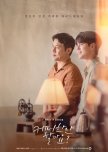
A Drama Which Will Try To Warm Your Heart…
KakaoTV’s miniseries ‘ Would You Like A Cup Of Coffee?’ is based upon manwha writer and artist Heo Young-man’s ( known for his original adapted-webcomics such as ‘ Gaksital’ and ‘ Tazza’, )original titled work ‘ How About A Cup Of Coffee?’ ( also known as ‘ 커피 한잔 할까요?’ ) and attempts to offer viewers a heartwarming cup of the slice-of-life genre.
The storyline focuses on main lead Kang Gobi (played by Seongwu Ong) - a college student who initially failed his examinations. After talking to his mother in a heart-to-heart conversation over the phone Gobi finds himself down-beaten and decides to sit down at a nearby coffee shop where he first meets Park Seok ( Park Ho-San). The owner of the cafe ‘Second Coffee’, Park Seok is naturally doubtful when Kang Gobi asks to become his student. However as Gobi begins training under the seemingly austere hand of the master barista, he begins to unveil the value of coffee to different individuals and customers throughout the storyline.
With a compacted plot due to its episodes’ duration time (an average of half-hour episodes), it’s unsurprising that the miniseries’ minimal storyline has lead to a divisive response amongst audiences.
This isn’t necessarily to say that ‘ Would You Like A Cup Of Coffee?’ ‘s plot is “ dull ” or “ prosaic”. The storyline may have been basic and offered a mostly platonic setup ( with only brief romantic hints or spurred-on misunderstandings which are soon resolved), it admittedly did give the miniseries many opportunities to explore more heartwarming storylines and bonds between characters .
However a natural downfall for these seemingly sweet storylines could often come across as lacking a more impactful and emotional punch for viewers. This was often as a consequence of each episode being built upon the same loose structural foundation; an initial introduction to a character , the presented dilemma and then often a quick-fixed solution or revelation by the end of each episode- not always necessarily a bad approach per say, but it didn’t always facilitate towards giving a more hard-hitting revelation for viewers which ( time limits aside) could’ve easily been wormed into scenes throughout the series .
Whilst admittedly it often felt as though camera angles could be a letdown for conveying more emotive scenes and emphasis on characters, the cinematography is masterful within its focus upon minimalist shades and palettes surrounding the cafe. The emphasis of beiges and light browns presented a warm-hearted and easygoing ambience in scenes surrounding the cafe- a microcosm world of safety and comfort for its customers and two baristas, as they shield away from the striking mundane reality of everyday life in the outside world .
The acting remained a strong forte for the miniseries. It was admittedly not flawless ( with certain performances remaining more questionable than others), but Park Ho-San and Seongwu Ong’s dynamic and naturally gradual mentor-teacher chemistry certainly became one of the major highlights for audiences. In addition to this ‘ Would You Like A Cup Of Coffee? ’ takes a pragmatic approach within its small niche of main and reoccurring characters - inclusive enough for audiences to understand their different roles and personalities , but arising to some more explorative issues also.
Kang Gobi is our main lead of the series. A “ self-conscious and downtrodden youth”, Kang Gobi’s facilitated character growth comes through his developed passion for coffee. Yet whilst Gobi admittedly did offer audiences with solidarity through being able to relate to similar struggles , it is honest to note that his character did often fall short of being an “everyday hero” due to sometimes lacking more subtle character growth through his journey rarely feeling more gradual, alongside lacking social or familial bonds outside of the storyline or prior to events ( with only a brief insight with his mother) to make him feel more like a sentient character .
The second male lead of the miniseries Park Seok embodies the typical “ sagacious master”archetype. The deuteragonist of the miniseries is mysterious, level-headed and a man of few words, but Seok is a surprisingly heartwarming character against all odds for audiences ; austere and aloof to begin with, but proving himself to be a sincere and supportive mentor and friend throughout different obstacles that Gobi faced in the series.
However Park Seok could often feel like an insipid character onscreen. With Seok’s archetype as a “ mysterious” archetypical main lead, the element of mystique is often key to piquing viewers’ interests and fascination. However where writers can often present opportunities for these characters to grow can be through revelations of their personality, identity and flaws which can sometimes purposefully change or at least shape a different perception upon characters for viewers . Admittedly whilst we gain some insight into Park Seok being widely revered by coffee connoisseurs as well as having unlikely social circles , we rarely had more opportunities to explore moments where Seok’s “ stoic” facade could be broken often rarely giving viewers an insight of his “ human” side through more emotive feelings or reactions.
There’s also the reoccurring side characters of the series who pragmatically exist to keep the storyline moving ( leading to some tender as well as wasted character opportunities); Kim Joo-hee ( Seo Young-hee)- a coffee lover and music columnist who shared a profound relationship with Park Seok and regularly visited the coffee shop , high schooler and part-time bakery worker Ga On ( Choo Ye Jin); a regular visitor who after an initial misunderstanding with Gobi, developed a friendship with the main lead and Ahn Min Na (Kim Ye Eun); a tired webcomic artist who is a regular customer at the cafe.
Then of course there’s the ending of the series; arguably without its problems by leaving some loose ends for viewers, but appropriate and without its more bittersweet edge either.
So what is left to say about the miniseries? Is it worth watching, or is it a waste of time? ‘ Would You Like A Cup Of Coffee?’ is similar to what its drama-title suggests; those expecting a darkly deep and powerful storyline with flawless and memorable execution and writing, may be slightly underwhelmed by the finished product of the miniseries. However for those who wish to indulge in the rich creamy sweetness of an easygoing and laidback binge-watch , alongside a fairy fast-paced plot and some heartwarming moments on the side, then ‘ Would You Like A Cup Of Coffee?’ is an ideal-watch.
Was this review helpful to you?

The Woe And Joys Of Adolescence …
Teen and high school storylines are not an unfamiliar subject in South-Korean popular culture , with myriads of teen films, productions and dramas being churned out every year en masse in South-Korea. However whilst many South-Korean film and drama enthusiasts find themselves drawn again and again to these setups , the typical depiction of “squeaky clean” high school life has left many enthusiasts torn about whether South-Korean directors and producers should try to push the boat out towards a more “ realistic” presentation of teens.
‘ Adult Trainee’ can be found somewhere between daring and eye-brow raising - belonging in one of the notably categories of South-Korean “ teen productions” which attempts to market itself at an older age demographic as well as being “ raw and truthful”.
This is certainly reflected within casting choices of rookie and lesser-known actors as our main lineup . However whilst this does create certain benefits for the storyline by respectfully a more mundane presence of the characters onscreen ( aside from the initially controversial casting decision of Miyeon), certain line deliverances and scenes admittedly could differ within quality and performance. Of course this isn’t to critique the cast or bring down their talents as actors. However it is crucial to point out to those expecting impeccable performances that you may be slightly disappointed by the final result.
The storyline itself is composed of three storylines ( and evidently three “main couples” ). Rising rookie actor Ryu Eui Hyun is the notable main character of the first few episodes as Seo Jae Min; a high-school boy addicted to sexual gratification and attempts abstinence in order to focus upon spending more time with his crush. Yet before we could even delve more into the highs and lows of Jae Min’s tale we are suddenly whisked away to another school and experience through notably conservative high schooler Yu Ra ( Jo Yoo Jung)’s exploration of casual relationships with a boy, as well as our final story through the problem of single high - schooler Na Eun( Kwon Young Eun)’s first experiences of love and feeling self-conscious about her body.
The seven-episode miniseries wasted no time within diving into each storyline and their problems, yet with a short time to cover these plot points and characters, it should come as no surprise that these executed plot points and characters could often feel incomplete.
Admittedly‘ Adult Trainee’ does interweave the subtext with some more “risky” issues of teen relationships. However it often felt as though the show wasn’t entirely sure which direction to go with these messages at times with more serious scenarios often being “ fixed” by feelings, romantic relationships or love, rather than taking the screen-time to focus upon character-building or growth.
In the miniseries we rarely saw these opportunities to understand more about our main characters’ social and emotional interactions.
Admittedly‘ Adult Trainee’ does interweave the subtext with some more “risky” issues of teen relationships. However whilst these “ problems” did touch upon some realistic issues for teens and helped to motivate plot-angst , ‘ Adult Trainee’ rarely took time to diverge from problems defining the characters. More realistic teen issues such as relationships with friends or family, likes, dislikes and searching for personal identity were rarely touched upon and even our main characters often felt shoehorned into particular tropes such as the “ infatuated teenage boy”, the “ goody-two shoes high-schooler” and the “ bullied girl” rather than well-defined or subversive approaches to the cliche archetypes.
In between the more “heavy” topics in ‘ Adult Trainee’, the miniseries does interweave the plot with notably more comical scenes. The comedy is fairly lighthearted- enough to generate perhaps a chuckle for audiences and necessary to take the weight entirely off certain issues , but admittedly variable in quality from scenes and context.
The ending of the series acted as a deadlock for ‘ Adult Trainee’ - enough to just briefly finish off some plot points of the final storyline, but admittedly lacking in an over-arching sense of fulfilment and satisfactory completion for audiences.
So this leaves the ultimate question; is ‘ Adult Trainee’ actually worth watching? ‘ Adult Trainee’ is a short miniseries which attempts to present itself as a more “ realistic” depiction of teenagers. ( Alongside comical scenes which may differ for audiences dependent on personal tastes.)Acting performances admittedly did vary from certain episodes and scenes but a possibly unfamiliar cast lineup for audiences will likely give the series some fresh appeal. The more “ daring” messages of the series whilst addressed, admittedly did feel slightly downgraded and lacked an impactful punch. As a consequence whilst the split narrative of the series for different episodes spiced up the storyline, characters often fell flat due to little time for audiences to digest their personalities and growth onscreen by instead often being shoehorned into romantic setups.
Overall ‘ Adult Trainee’ was the epitome of a “ binge-watch” drama to watch when you have nothing else to do; not unwatchable and certainly entertaining within its different plots, setups and heartwarming messages , but admittedly lacking in more subtle character growth, plot buildup and diverse as well as more relatable and realistic issues for teens.
Was this review helpful to you?

Is This A ‘Hellbound’ Experience?
With director and screenwriter Yeon Sang-ho (Train to Busan) and co-writer Choi Kyu-Seok basing the series upon their own webcomic and original production, this does leave viewers with one ultimate question; “ is ‘ Hellbound’ actually worth watching ?”
For jaded and cynical detective Jin Kyeong-hoon (Yang Ik-june) humanity has offered him nothing but pain and sorrow. Still trying to come to grips with his wife’s brutal murder and having a fractious relationship with teenage daughter Hee-jeong (Lee Re), Jin’s research into the cases leads him face to face with leader of the mysterious cult ‘ New Truth’, Chairman Jeong Jin- Soo ( Yoo Ah-in). The cult has pledged salvation for “ sinners” by spreading gospels of the angels and encourage them to “ repent”. However as episodes progress it soon becomes slowly apparent towards Jin-Soo’s true nature and the brutal goals of the group, with attorney Min Hye-jin (Kim Hyun-joo) pledging representation for the alleged “ sinners”.
The biggest thing to address about ‘ Hellbound’ is that it isn’t a show for the lighthearted. Whilst devoted fans of the webcomic may notice some subtle storyline changes ,the show is violent and not afraid to present brutal murders alongside people being combusted like human torches throughout the series.
Intertwined amongst the shoddy CGI monsters of ‘ Hellbound’ as well as alongside the spine-tingling OST by Kim Dong-wook, ‘ Hellbound ‘ expertly paces its descent into chaos, knowing when to slow down on abominable killings and when to present its moral deadlocks . From the rising corruption of religion and the cultural phenomenon in South Korea of hysterical puritanism, hypocrisy as well as the rise of extreme conservative views paradoxical to the insatiable appetite of society for violence through popular culture, ‘ Hellbound’ addresses a lot of issues without shame or embarrassment and with the entire purpose to expose current issues and realities in South-Korean society. However this is also where the series began to hit a rut after the midway point; it never really carried through these messages with regards to the medium of the series . Whilst some characters are used with a purpose, some seemingly quintessential main characters have rushed arcs or suddenly disappear without rhyme or reason, whilst the climax and rising tension of the drama often went on a downwards slope after the halfway point.
The acting front is admittedly a mixed-bag ( especially with some line deliverances by the supporting characters.) Of course whilst the main cast shone throughout, one of the most dynamic performances throughout the show was surprisingly Yoo Ah-In’s performance as fanatic cult leader Chairman Jin Soo .
Whilst main lead Jin Kyeong-hoon is admittedly a complex character type as the “ cynical cop” and female lead Hye-Jin as the “ attorney”, they often felt tightly crammed into their roles as stock characters tropes . This isn’t necessarily a bad approach per say and did give director and screenwriter Sang-Ho opportunities to reimburse old character tropes for his own gain, but it did little to really diverge these main leads from their expected decisions and actions, often leading them to be shoehorned into the plot ( as well as lacking more profound depth) rather than allowing the characters to move coherently within the contents of the storyline. For example a major subplot surrounding the series for Kyeong-Hoon is the murder of his wife. Whilst later revelations play briefly upon this subplot, the profound details surrounding Hoon’s reactions as well as his relationship with daughter as a consequence were left underexposed, and therefore lacked more sound emotional-depth also.
Of course getting back to our mysterious chairman it isn’t necessarily the case that he was executed as an entirely “ original villain” as after all Sang-Ho does enjoy playing upon Jin Soo as the “ calm and quiet” archetype. However where Sang-Ho creates mystery surrounding Jin-Soo is that he isn’t a “ redeemable antagonist with a painful past” or “twirling his moustache planning world domination”, but just a regular person with a megalomaniacal desire to deliver his warped sense of “ justice”. However whilst Jin Soo helped us to bring together our main characters and kept the storyline moving, his anticlimactic character arc and exit from the series raided more questions than answers afterwards.
This was often a major problem with ‘ Hellbound’- plot points which could’ve been meticulously executed onscreen or poignant for audiences to reflect upon, felt missed out completely by Sang-Ho’s imbalance of subtext against plot. For example even through the cinematography and as the director Sang-Ho never seemed entirely sure how he wanted to capture the world of the characters. Seemingly ordinary or gritty early episode scenes hinting at the unexpected, turned into moody and drab aesthetic shots of Seoul straight out of a noir crime series. This isn’t necessarily unheard of a director playing with mood or lighting to convey messages or by transcending genres. However , directors or cinematographers usually have a vision in mind when invoking these scenes for viewers. Sang-Ho seemed often uncertain even through the objective lens of the director with how this truly captured or presented the emotional mind-frame of his characters . . Adding to this Yeon and Choi weigh down each dramatic scene straight out of a jump-scare movie; the monsters’ attacks feel animalistic and playfully sadistic, but never truly added a more profound and impactful tone for audiences.
The ending of the series attempt to crank up the shock value to the maximum with the delivered revelations of the finale. However whilst the series does leave a more open ending through a cliffhanger major characters arcs, subplots and storyline moments were rarely tied together or felt more complete as a consequence.
So what is left to take from ‘ Hellbound’? ‘ Hellbound’ is a pacy supernatural thriller with an intriguing plot wrapped into six episodes. Aside from some dodgy acting by our side characters, the main cast were decent enough and the standalone performance by Yoo Ah-In did give the drama some undeniably charisma. However one of the major problems with the Netflix series is that it becomes lost in a maze of its own doing; subtext themes and plot were often lacking in depth and more profound deliverance, whilst even some of our main characters lost their gravitation to audiences by abrupt exploration and coverage alongside an incomplete ending. The series attempts to deliver a “ terrifying” experience through the CGI “ monsters” of the series whose design and presence onscreen felt insipid. Overall ‘ Hellbound’ is not a bad per say during a binge-watch session with an intriguing enough plot to keep you engaged, but certainly lacking within delivering a more sound impact for viewers also.
Was this review helpful to you?
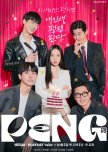
Sweet Enough To Give You A Tooth Cavity…
If there’s one thing South-Korean mini dramas absolutely love with romantic-setups it is the “reverse-harem” trope. Unsurprisingly ‘ Peng’( 팽) is no exception and offers viewers the typical cutesy sweet “ potential love interests” for the seemingly “ average” and “ older noona” ( who in reality is only supposed to be thirty) female lead.
Of course it is wrong to entirely critique ‘ Peng’ as “ unwatchable”. Go Sa Ri ( Yoon So Hee) is a 30 year old woman who finds herself rethinking her life decisions after she parted ways with her former boyfriend.Soon she finds herself in a sticky situation as she finds several potential love interests entering her life with complicated feelings evidently growing for them.
The acting is a mixed-bag admittedly. It is hardly Oscar-winning and there are certainly moments where you might question certain line deliverances, but it is certainly passable to watch . Main actress Yoon So Hee has starred in many guest roles over the years but likely is more recognised by K-pop fans for her starring roles in music videos for boyband EXO, an uncredited role in a music video for SHINEE and in one of Super Junior’s concert tours. The actress certainly was decent enough as our female lead and did add her own sweet charm to her role. However the biggest problem with the casting choice for So Hee as Go Sa Ri was that it was hard to truly believe she was the authentic age of her character.
Of course this isn’t to critique the actress or her character Sa Ri entirely. She’s a fairly hardworking heroine. However to explain this point about age further it is important to establish that a younger actor/ actress being cast to play an older (or even vid verse ) isn’t always necessarily a bad move by the casting crew. Often it can work to a drama/ storyline’s advantage by interpolating both with the necessity of their character’s looks, personality or context within the storyline . On the other hand what makes us feel as though a character is truly the age that the writer has mind doesn’t just come down to physical appearance but very subtle touches such as emotions, maturity, popular culture references, generation gaps or social interactions. In ‘Peng ‘ whilst we did see Sa Ri mope about her age at times and show a more mature side also, these key plot touches rarely had more of a quintessential role within shaping Sa Ri’s identity or authenticity as our female lead .
In fact when it boils down to it Sa Ri rarely felt as though she had a more of a realistic edge. She rarely felt flawed or would be allowed to repent for her actions, by often taking central state as the “ victim” or “ pitiful” and even when we did get glances into her life sans romantic relationships, her “ friends” would rarely interact upon a basis which didn’t involve relationships or romance. Even more in-depth glances into her past as well as her familial environment we’re fairly in- existent throughout the drama rarely giving Sa Ri to feel like a well-written female lead.
Naturally the major driving factor of the cutesy pastel-infused romantic setup of ‘ Peng’ boils down to Sa Ri’s “ potential love interests”. ( Unsubtly hinted by one of Sa Ri’s male colleagues that Sa Ri should get married as “she’s getting older”.)Typical of this genre the male leads are mostly used as the “ shiny boy toy” trope with being either fairly good looking, fashionable or a trope archetype in themselves but are mainly used as plot devices to keep the plot moving rather than to have more evident character depth and growth.
Sa Ri’s first “ potential love interest” is Pi Jung Won ( Choi Won Myung). Pi Jung Won is the classic “ childhood friend” trope. Knowing Sa Ri the longest , Jung Won arguably knew the most about Sa Ri out of all the other suitors. The biggest problem with Jung Won as the “ childhood friend” is that whilst he unsurprisingly has “ liked Sa Ri since forever” he never really addresses what initially attracted him to her, his own complicated feelings with Sa Ri viewing him as a fraternal figure as well as meekly remaining in the corner with his hidden feelings until “ necessary plot” drives him out.
Sa Ri’s next potential romantic partner is Yeon Ha Rim ( Kim Hyun Jin). The biggest thing to address about actor Kim Hyun Jin is that in real life he is closer in age to So Hee than his younger onscreen counterpart. His onscreen persona being the embodiment of the “ younger guy”, there’s undeniably mixed feelings for viewers towards this onscreen potential chemistry between their characters ( especially as he does begin to dominate a lot of screen time by the halfway mark). Whilst undeniably Sa Ri does not hide her initial awkward feelings and there are some evident “age appearance” issue addressed , it may raise more questions for viewers by the more sugarcoated approach to realistic factors such as cultural norms, controversy and perceptions towards age gap relationships in South Korea.
Then there’s Sa Ri’s potential suitor through Ki Sun Jae ( Joo Woo Jae)- . Sun Jae embodies the classic “ he’s my boss” and the “ CEO” trope. His potential chemistry with Sa Ri has its strengths and weaknesses. On one side he’s arguably the most mature, decisive and affluent out of the other love interests. On the other hand Sa Ri’s evident discomfort towards pursuing a romantic relationship with her boss does put some strain on their relationship as employer and employee.
Then finally there’s Jeon Woo Sang ( Lee Seung II). Sa Ri’s ex, Jeon Woo spends his time pining over Sa Ri. Whilst some viewers may see this as “sweet”, others will likely see Jeon Woo’s actions as verging upon being a stalker and megalomaniacal from wanting to know about Sa Ri’s love life following her and waiting outside of her house on several occasions.
The final decision by Sa Ri was beyond anti climatic. It was not necessarily bad per say that Sa Ri made this choice as it was upon her own grounds, however, rather than providing this choice with more explanation or build-up, Sa Ri’s decision truly gave the series a poorly-inserted deus ex machina ending; added for the “ unexpected”, yet lacking in more coherent character direction or growth in the process.
So what is left to say about ‘ Peng’? As a miniseries ‘ Peng’ is pretty much what it said it would be on the tin; a romantic show reverse- harem about an older woman choosing her potential romantic love interests. Whilst the show was lighthearted, it often seemed to struggle with conveying more depth to the characters, plot drive ( aside from romantic misunderstandings and lacklustre tropes) and a decisive ending with many profound themes often feeling sugarcoated. Whilst not unwatchable per say ‘ Peng’ lacked that specific zest of being an engaging , memorable or well-written storyline with an ending that will make even the most patient of viewers towards what on earth you just wasted your time upon.
Was this review helpful to you?

Will This Series “ Raise” Your Patient Levels ?
Even by K-drama standards pushing the boat out from “ first lovers meeting again ” to “ let me treat your erectile dysfunction” is definitely a bold and risky concept to work with. However screenwriter Mo Ji Hye and director Kim Jang Han’s ‘ You Raise Me Up’ is arguably one of the most “gutsy” dramas in recent years by focusing on a risky subject area, combined with an oddly heartwarming and profound tale also.
Do-Young sik (Yoon Shi Yoon) works multiple part-time jobs at a restaurant bar that he perceives as “ menial” work and being unable to pass the civil service exam. A self-proclaimed “ loser” ( made even more obvious by director Kim Jang Han’s choice of ‘ Creep-Radiohead’ being played briefly in the background of the main lead’s inner monologue in episode one), Young-Sik lacks self-confidence both within his life decisions and his manhood. When he decides to consult a professional about his erectile problem, he ends up unfairly running into his first love and now a urologist Lee Ru Da (Ahn Hee Yeon).
In an attempt to prove her ex-boyfriend Ji-hyuk (Park Ki Woong), a successful high-flyer psychologist wrong about misconceptions of her first love ( after bragging to him about Young-Sik), Ru Da decides to make it her mission to “ boost his self-esteem”. However Ji-Hyuk’s wounded ego gets the better of him as he enlists himself to “ help” Young-Sik in order to “ expose” him. However as Young-Sik and Ru-Da begin to spend more time together sparks once more begin to fly between them…
As far as the acting is concerned our main cast are fairly good throughout the drama. Of course Yeon Shi Yoon never fails to impress his dual balancing act of adding comical goofiness as well as a more profound note to his roles . As a character Yong-Sik fits very much into the category of the “ unconfident and antisocial” male lead. Aside from his evident sexual problems, Yong-Sik struggles with his self-image as well as his obsession over pink.
Yet whilst Yong-Sik’s initial struggle and sexually suggested scenes aim for more comic relief than melodrama, it is undeniable that the series does offer some opportunities to explore a more complex edge to Yong-Sik’s background and self-loathing ( stemming back from initial trauma). On the other hand whilst the direction of Yong-Sik’s character was taken in the right direction to explore his kindhearted and altruistic side over the course of episodes and revelations, the drama rarely devoted itself to more possibilities and depth surrounding Yong-Sik’s traumatic past and psyche. ( Especially considering his more serious actions in the first episode as well as his repressed attempts to hide memories and associations.) For example an evident source of regret for Young-Sik is consulting his mother about his current occupation and life. Whilst it is understandable where these anxieties might lie due to feeling rejected, it felt odd that the series didn’t offer many opportunities for Young-Sik to at least attempt to consult his mother or address hus anxiety surrounding this head-on.As a consequence it often felt as though Yong-Sik was often shoehorned into the role of the “ pitiful” main lead; easy to feel sympathy for and to root for, but rarely truly escaping or at least shown to struggle more with his journey by his emotions.
Naturally this moves onto our female lead Lee Ru Da. Ru Da is the epitome of the stock “ successful yet regretful” female lead. Yet whilst she is played played with a sweet charm by Ahn Hee Yeon during more heartfelt moments, her character is admittedly a little hard for audiences to truly be won over by. Of course the female lead isn’t necessarily a “ heinous person” per say and whilst her flaws help her to feel more human amongst later revelations, it is easy to understand how screenwriter Mo Ji Hye’s intentions for us to “ root” for Ru Da as a character were often harder than perceived due to ambivalent feelings for the female lead by viewers.
The main reason for this indecisiveness stems from the fact that whilst a lot of “ revenge” romance setups stem from the cliche of “ revenge upon my ex”, Ru Da takes it one further by taking advantage of Yong-Sik’s feelings and mental state initially. Perhaps it wouldn’t be too bad if we could have understood more about Ru-Da’s oppressed emotions, her interactions outside of her romantic relationships ( with family, friends or other patients), reasons for staying with Ji-Hyuk for so long ( aside from the brief flashback from their “ shared past”) as well as exactly how and why she lost contact with Yong-Sik ( especially after effectively saving her life) , but a lot of these “ details” are often brushed over. Whilst the series did attempt to offer some more sympathy for her character through her “ emotions rising to the surface”, it was a little hard to indicate exactly how Ru-Da grew or developed as a character by instead reverting back to her younger-self’s emotions rather than trying to make amends through a sincere apology to Yong-Sik.
As far as the romantic setup is concerned ‘ You Raise Me Up’ the creme de la creme of tropes; “ the love triangle”. This naturally brings us onto one of the most easily dislikable second male leads seen in a K-drama in a long time; Ji-Hyuk. It isn’t necessarily the case that merely because Ji-Hyuk is the “ jealous ex” that he can get under viewers’ skin. Instead it is rather the case that Hyuk is conniving and manipulative and would rather allow his biased emotions cloud his judgement, rather than remain professional in his line of work as a psychiatrist. Of course whilst Ji Hyuk is necessary in the series to acting as the “ antagonistic foil” for Yong-Sik and does help to drive the plot as a consequence, a lot of Ji-Hyuk’s reasoning, goals and feelings often felt and domed throughout the series.
Then of course there’s arguably Yong-Sik’s most loyal friend in the series, Jennifer ( Kim Seol Jin). Whilst some viewers have remained uncertain towards the show’s tropes and cliches surrounding the transgender woman shaman, Jennifer did remain an instrumental supporting character in the series by offering Do Yong Sik positive advice such as to seek professional help, as well as giving Yong Sik guidance towards his own feelings for Du Ra. Perhaps the only thing which would’ve been interesting to have explored with their friendship would have been Yong-Sik consulting Jennifer about his attempted act in episode one. Whilst it may have brought some pain and hurt into their bond, it would’ve certainly cleared some more evident uncertainty within their friendship after this action.
The ending was admittedly sweet yet expected- not bad per say and offering things on a happier as well as arguably a slightly more realistic edge within the main leads’ life decisions , but slightly predictable also.
Overall ‘ You Raise Me Up’ is arguably one of the most quirky romance dramas of 2021 with an impressive cast lineup. The sweet and lighthearted premise adds a more bittersweet edge and whilst certain characters felt unexplored or shoehorned into certain roles ( alongside cliches), the main leads’ later decisions and revelations did add a touch of character development in between. Overall whilst not a flawless drama, ‘ You Raise Me Up’ is certainly a decent watch for those looking for something a little avant-garde, or more risky within K-dramas.
Was this review helpful to you?






















